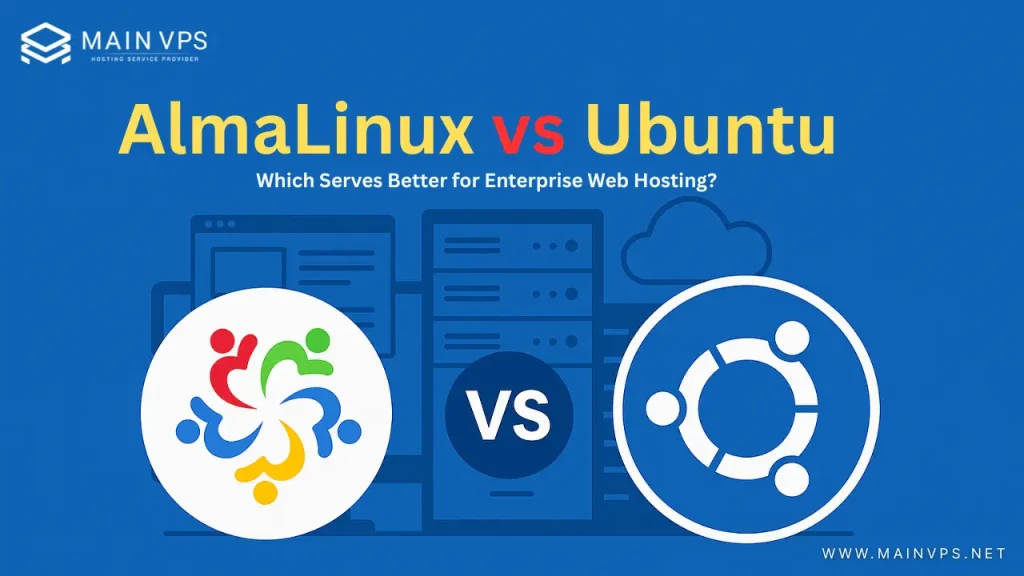
If you’ve ever managed enterprise servers, you know that choosing the right Linux distribution isn’t about personal preference — it’s about trust.
When uptime, compliance, and long-term stability are on the line, every sysadmin and CTO eventually faces the same question:
Should we build our hosting environment on Ubuntu, or switch to AlmaLinux?
Both are industry heavyweights. Ubuntu powers cloud platforms and DevOps pipelines worldwide. AlmaLinux, on the other hand, has quietly become the spiritual successor to CentOS, earning serious credibility among enterprises that need RHEL-level reliability without licensing costs.
I’ve deployed and maintained both in real production setups — from multi-tenant cPanel hosting to containerized SaaS applications — and here’s the honest, human, experience-based comparison you won’t find in vendor brochures.
Where Each Comes From — Two Different Histories, Two Different Philosophies
1. Ubuntu: The Innovator’s Choice
Ubuntu grew from Debian’s open-source roots but was shaped by Canonical with one big mission: make Linux simple and accessible — for everyone.
Today, Ubuntu dominates cloud environments. It’s the default OS on AWS, Google Cloud, and Azure. Developers love its apt ecosystem, modern package support, and how it “just works” out of the box for web apps, containers, and CI/CD workflows.
2. AlmaLinux: The Enterprise Successor
When Red Hat discontinued traditional CentOS in favor of CentOS Stream, system administrators were left scrambling. AlmaLinux was born from that disruption — a 1:1 binary-compatible rebuild of RHEL, maintained by the non-profit AlmaLinux OS Foundation.
In short:
Ubuntu is built for agility. AlmaLinux is built for assurance.
How Enterprises Actually Evaluate Hosting OSes
In theory, both are free Linux distributions.
In reality, enterprises don’t just look at price tags — they care about stability, support, compliance, scalability, and lifecycle.
Let’s walk through what matters most when you’re hosting production workloads.
1. Stability and Uptime
If your business runs on strict SLAs, downtime isn’t an option.
Here, AlmaLinux inherits Red Hat’s legendary stability. Its kernel and package versions are vetted for years, not weeks. Each release offers a decade of support (until 2032 for AlmaLinux 9) — ideal for long-term projects and critical infrastructure.
Ubuntu LTS releases promise five years of support (ten with Ubuntu Pro), which is respectable — but Ubuntu updates more aggressively. That’s great for innovation, but sometimes tricky in environments where “unchanged equals safe.”
Verdict:
✅ AlmaLinux wins for mission-critical workloads that demand rock-solid consistency over rapid updates.
2. Performance and Scalability
Performance-wise, both are excellent — but they feel different in practice.
- Ubuntu tends to run lighter in developer-centric stacks — Node.js, Go, Docker, or Kubernetes. It’s the default OS in most container images for a reason.
- AlmaLinux is fine-tuned for high-traffic, persistent hosting workloads — large MySQL databases, LAMP stacks, ERP applications, or cPanel environments.
In benchmark tests we’ve run at MainVPS, Ubuntu handles dynamic workloads a bit faster out of the box, while AlmaLinux shows better consistency under sustained load — especially when caching or heavy disk I/O is involved.
Verdict:
⚖️ Ubuntu for flexibility and developer velocity; AlmaLinux for predictable enterprise throughput.
3. Security, Compliance, and Governance
This is where the real enterprise line gets drawn.
AlmaLinux inherits SELinux, FIPS-certified cryptography, and SCAP security profiles directly from RHEL. That makes compliance with standards like PCI-DSS, HIPAA, or ISO 27001 straightforward.
Ubuntu uses AppArmor — easier to manage for small teams, but less granular for enterprise policy enforcement. Canonical’s Ubuntu Pro subscription adds FIPS and CIS hardening, but that’s a paid layer.
If your company must pass audits, integrate with government systems, or store sensitive data, AlmaLinux’s baked-in security framework saves a lot of effort.
Verdict:
🛡️ AlmaLinux leads for enterprise-grade security and regulatory compliance.
4. Software Ecosystem and Tooling
Both ecosystems are huge — but their strengths differ.
- Ubuntu: First to receive new open-source packages. Almost every DevOps or cloud-native tool (Docker, Kubernetes, Ansible, Terraform, Jenkins) is developed and tested on Ubuntu first.
- AlmaLinux: Mirrors the RHEL world, meaning cPanel, WHM, Plesk, and DirectAdmin run flawlessly. If you manage hundreds of hosted sites or reseller accounts, this is crucial.
In our hosting operations, we often pair AlmaLinux 9 with cPanel for shared hosting, and Ubuntu 22.04 LTS with Docker for SaaS projects. Each excels in its own lane.
| Environment Type | Recommended OS |
|---|---|
| Shared or reseller hosting | AlmaLinux |
| Cloud-native apps & containers | Ubuntu |
| Database-heavy ERP systems | AlmaLinux |
| Developer sandboxes & CI/CD | Ubuntu |
Verdict:
🎯 Choose based on workload. There’s no one-size-fits-all.
5. Ease of Management and Administration
- Ubuntu uses the
aptpackage manager — clean, fast, intuitive for developers. - AlmaLinux sticks with
dnf(formerlyyum) — familiar to anyone from a CentOS or RHEL background.
Both support automation tools like Ansible and SaltStack.
Ubuntu’s quick release cadence means you’ll do upgrades more often; AlmaLinux’s decade-long cycle means you’ll sleep better at night once it’s set up.
Verdict:
⚙️ Ubuntu feels modern; AlmaLinux feels mature.
Real-World Scenarios: What Works Best
1. Managed Hosting Providers
If your business runs multiple cPanel or WHM servers, AlmaLinux 9 is the clear successor to CentOS 7.
It’s officially supported, stable, and RHEL-compatible — with zero licensing cost.
Pair it with a MainVPS VPS Hosting India for low latency and local reliability.
2. SaaS or DevOps Teams
Teams deploying microservices or CI/CD pipelines often choose Ubuntu LTS.
It integrates beautifully with Docker, Kubernetes, and cloud APIs, and developers rarely need to compile anything manually.
3. Regulated Enterprises
Banks, healthcare platforms, and public sector systems still favor RHEL-compatible distributions.
AlmaLinux’s SELinux profiles and predictable lifecycle make audits smoother and risk management simpler.
Lifecycle and Support Comparison
| Feature | AlmaLinux 9 | Ubuntu 22.04 LTS |
|---|---|---|
| Base Compatibility | RHEL 9 | Debian 12 |
| Release Year | 2022 | 2022 |
| Standard Support | 10 years (till 2032) | 5 years |
| Extended Support | Free (community) | Ubuntu Pro – paid |
| Security Framework | SELinux + FIPS | AppArmor |
| Control Panel Support | Excellent | Limited |
| Cloud Integration | Broad | Best-in-class |
Expert Takeaways from the Field
After years of managing both distros, here’s what genuinely stands out:
- AlmaLinux behaves like that reliable old server you can forget about — it just runs.
- Ubuntu feels like a fast-moving toolbox that evolves with every new tech trend.
In our data centers, we use AlmaLinux for everything customer-facing (web hosting, databases, email) because clients expect uptime and consistency.
We use Ubuntu behind the scenes — for build servers, staging environments, and automation systems that thrive on agility.
If your infrastructure leans toward stability, compliance, and uptime, AlmaLinux wins.
If it leans toward experimentation, integration, and modern DevOps, Ubuntu is the better companion.
Final Verdict: Choose by Purpose, Not Popularity
There’s no universal winner — only what’s right for your stack.
| Scenario | Best Fit |
|---|---|
| Long-term enterprise web hosting | 🏆 AlmaLinux 9 |
| Cloud-native or developer workflows | 🚀 Ubuntu 22.04 LTS |
| Compliance-heavy industries | 🔐 AlmaLinux |
| Rapid prototyping or SaaS startups | 💡 Ubuntu |
| cPanel / Plesk hosting | 🧱 AlmaLinux |
If your enterprise values consistency and long support cycles, go with AlmaLinux.
If you’re building fast, modern platforms that thrive on frequent updates, Ubuntu will feel like home.
Whichever path you choose, make sure the infrastructure beneath it is just as dependable.
At MainVPS, we host both — optimized for performance, uptime, and 24×7 expert support.
FAQs
1. Why did so many companies switch from CentOS to AlmaLinux?
Because AlmaLinux offers full RHEL compatibility with no subscription fees. It’s a direct, stable replacement for CentOS 7/8.
2. Which OS is better for cPanel or Plesk?
AlmaLinux 9. Most major control panels officially support only RHEL-based distributions.
3. Which updates faster — AlmaLinux or Ubuntu?
Ubuntu updates more frequently with newer kernels and packages. AlmaLinux favors long-term stability and consistency.
4. Can both run Docker and Kubernetes?
Yes, though Ubuntu’s ecosystem has better documentation and community support for container tools.
5. What’s the safest choice for enterprise compliance?
AlmaLinux — with SELinux, FIPS compliance, and SCAP policies included out of the box.
Final Thoughts
In the end, both AlmaLinux and Ubuntu are exceptional — just different flavors of reliability.
AlmaLinux gives you the calm confidence of RHEL-grade stability.
Ubuntu gives you the creative freedom of modern Linux innovation.
So don’t choose based on popularity — choose based on what your business actually needs:
- Long-term hosting stability? → AlmaLinux 9
- Developer-friendly agility? → Ubuntu LTS
Either way, pairing your OS with a powerful, secure server environment — like MainVPS Enterprise Hosting — ensures your infrastructure runs at peak performance, every single day.





